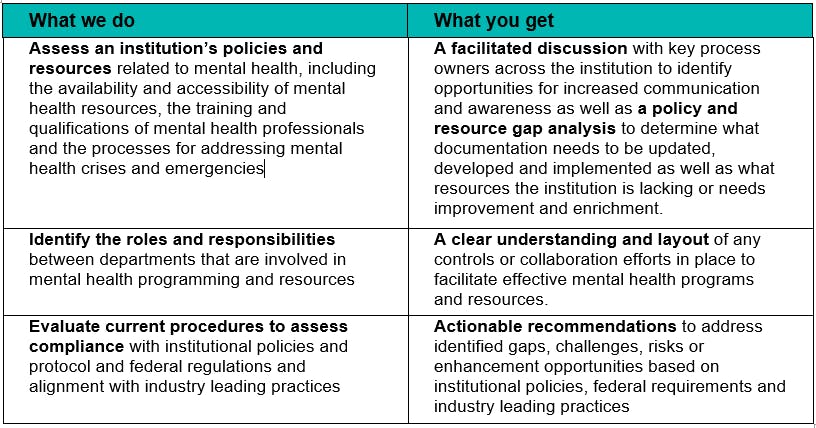Case study: student mental health assessment in action

Institution need
A higher education institution client acknowledged increasing worries regarding its students' mental health and recognized the necessity to enhance its support system to aid students in achieving academic success while maintaining their mental, physical and emotional well-being. Through an initial assessment of existing student mental health support, the institution presented its recommendations to leadership, offering valuable feedback on strategies for the institution to meet the mental health and wellness requirements of its students.
Baker Tilly solution
Building upon the institution's initial efforts, the Baker Tilly team expanded on its work by offering additional insights and recommendations to strengthen student mental health and wellness support. Our evaluation encompassed an examination of the university's frameworks, models and tools, such as case management, along with benchmarking the institution against accreditation standards. Furthermore, we reviewed the responsibilities and communication mechanisms among relevant departments, including contractual obligations, to develop a comprehensive understanding of the existing structure.
While recognizing the institution's efforts in fostering a culture that promotes student mental health initiatives, our team observed several areas requiring attention. First, the statement of care, a crucial document providing students with vital information regarding available resources, services and limitations, was not widely disseminated.
Additionally, the web-based resources provided were overly general, lacking essential emergency guidance. Furthermore, due to the lack of a formalized model and in some instances, case management, the institution struggled to meet the growing student demand, resulting in lengthy wait times for mental healthcare.
Results achieved
Our recommendations for the institution included implementing formal definitions for the case management structure and exploring additional support measures, such as:
- Campus workshops
- Group therapy sessions integrated into academic settings
- One-credit emotional regulation courses
- The establishment of peer mentorship programs
Overall, Baker Tilly provided the institution with a comprehensive evaluation of their student mental health support system and developed specific recommendations to address identified issues. Baker Tilly provided valuable insights and actionable recommendations to assist the institution in improving their support structure for student mental health and wellness.


